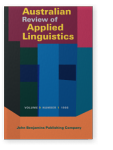Curriculum renewal in school foreign language learning
An overview
John L. Clark | Lothian Regional Council and Australian Language Levels Project
“But you, who are wise, must know that different Nations have different conceptions of things and you will therefore not take it amiss, if our ideas of this kind of education happen not to be the same as yours. We have had some experience of it. Several of our young people were formerly brought up at the colleges of the northern provinces; they were instructed in all your sciences; but when they came back to us, they were bad runners, ignorant of every means of living in the woods .... neither fit for hunters, warriors, nor councellors, they were totally good for nothing.
We are, however, not the less oblig’d by your kind offer, tho’ we decline accepting it: and, to show our grateful sense of it, if the gentlemen of Virginia will send us a dozen of their sons, we will take care of their Education, instruct them in all we know, and make men of them”.
(Response of the Indians of the six nations to a suggestion that they send boys to an American college, Pennsylvania, 1744).
References (20)
Breen, M.P.
(
1984)
Process syllabuses for the language classroom. In
Brumfit, C.J. (ed.) (1984)
General English syllabus design. Oxford, Pergamon Press in association with The British Council: 47–60.

Breen, M.P., and C. M. Candlin
(
1980)
The essentials of communicative curriculum in language teaching.
Applied Linguistics. 1, 2:89–112.

Brumfit, C.J.
(
1980)
From defining to designing: communicative specifications versus communicative methodology in foreign language teaching.
Studies in Second Language Acquisition. 3, 1:1–9.


Candlin, C.N.
(
1984)
Syllabus design as a critical process. In
Brumfit, C.J. (ed.) (1984)
General English syllabus design. Oxford, Pergamon Press in association with the British Council: 29–46.

Dearden, R.F.
(
1972)
Needs in education. In
Dearden, R.F.,
Hirst, P.H., and
Peters, R.S. (1972)
Education and the development of reason. London, Routledge and Kegan Paul: 50–64.

Harding, A., B. Page, and S. Rowell
(
1980)
Graded objectives in modern languages – CILT.

Higgs, T.V.
(ed.) (
1984)
Teaching for proficiency: the organizing principle. Skokie, Ill., National Textbook Company in conjunction with the American Council on the Teaching of Foreign Languages.

Hoyle, E.
(
1973)
Strategies of curriculum change. In
Watkins, R. (ed.) (1973)
In-service training: structure and content. London, Ward Lock Educational: 91–103.

MacDonald, B., and R. Walker
(
1976)
Changing the curriculum. London, Open Books.

Prabhu, N.S.
(
1980)
In Newsletter 1/4. South India, Bangalore, Regional Institute of English.

Rudd, A.
(
1973)
Local curriculum development. In
Watkins, R. (ed.) (1973)
In-service training: structure and content. London, Ward Lock Educational: 113–124.

Schon, D.A.
(
1971)
Beyond the stable state. Harmondsworth, Penguin.

Skilbeck, M.
(
1982)
Three educational ideologies. In
Horton, T., and
Raggatt, P. (eds.) (1982)
Challenge and change in the curriculum. Hodder and Stoughton/Open University.

Stenhouse, L.
(
1975)
An introduction to curriculum research and development. London, Heinemann.

Stenhouse, L.
(
1979)
Research as a basis for teaching. Inaugural lecture. Norwich, UK., University of East Anglia.

Stevick, E.W.
(
1976)
Memory, meaning and method. Rowley, Mass., Newbury House.

Taba, H.
(
1962)
Curriculum development: theory and practice. New York, Harcourt, Brace and World.

Trim, J.L.M.
(
1978)
Some possible lines of development of an overall structure for a European Unit/Credit scheme for foreign language learning by adults. Council of Europe. Published 1980 as
Developing a unit-credit scheme of adult language learning. Oxford, Pergamon.

Welford, A.T.
(
1968)
Fundamentals of skill, London, Methuen.

Cited by (2)
Cited by 2 other publications
This list is based on CrossRef data as of 29 june 2024. Please note that it may not be complete. Sources presented here have been supplied by the respective publishers.
Any errors therein should be reported to them.
